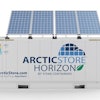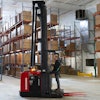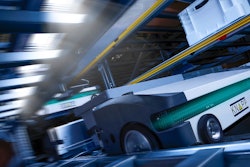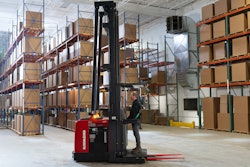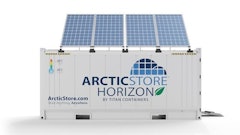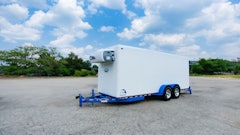
As supply chains have evolved to accommodate growing consumer demand and a variety of temperature-sensitive products, the use of specialized storage solutions has become increasingly critical across a wide array of industries. One such solution is the cold storage warehouse.
From food and pharmaceuticals to chemicals and biotechnology, companies rely on cold storage warehousing to ensure the integrity of their products. But with a multitude of available options, selecting the right cold storage solution can be daunting for even the most well-run operation.
Cold storage as a vital link in the supply chain
Cold storage warehousing is integral to cold chain logistics, which ensure that temperature-sensitive products are transported and stored under appropriate conditions throughout the supply chain. From farm to table, these specialized storage facilities help to maintain product quality, safety and longevity.
In fact, it has become such a vital link that the global cold storage market is expected to reach nearly $146 billion by 2028, driven primarily by growing consumer demand for the temperature-controlled storage of perishable goods such as fresh produce, frozen foods and pharmaceuticals.
Depending on temperature needs, cold storage warehousing falls into one of two distinct categories: refrigerated and frozen. Refrigerated warehouses—also known as chill stores—typically maintain temperatures between 35°F and 47°F to prevent cold loss for perishable foods such as fresh produce and dairy products. Frozen warehouses, on the other hand, operate in sub-zero temperatures between 0°F and -13°F. These facilities are designed to store frozen foods like meats, seafood and desserts that must be kept at low temperatures to prevent bacterial growth and maintain product integrity.
Challenges posed by cold storage warehousing
Compared to more traditional storage facilities, cold storage warehousing presents several unique challenges that must be addressed during the selection process. This underscores why it is so crucial to partner with an experienced provider who understands the specifics of your cold storage requirements.
Equipment reliability is perhaps the biggest concern, as any failure can lead to spoilage, contamination or even loss of goods. It is critical that precise temperature and humidity levels are maintained at all times. Cold storage facilities also consume up to 30% more energy than their ambient counterparts because of the need for continuous refrigeration. Balancing cost with energy efficiency is key.
To add to this, inventory management becomes more complex in cold storage environments due to rotation requirements based on expiration dates and product-specific storage conditions. This added complexity can lead to higher operational costs and greater inefficiencies if not managed properly.
Adherence to stringent regulatory requirements is another key challenge. For example, the Food & Drug Administration (FDA) has strict guidelines on storage conditions to guarantee product quality and safety. Compliance with such regulations can not only be complex, but also resource demanding.
Key considerations for selecting a cold storage warehouse
Cold storage warehousing plays a vital role not only in preserving the integrity of your products, but also in maintaining regulatory compliance and improving operational efficiency. From temperature control and energy efficiency to compliance certifications and security features, here are several factors that should be carefully considered when choosing a cold storage warehousing solution:
· Temperature control and monitoring. The cold storage warehouse must be able to maintain precise temperature levels tailored to the specific requirements of your products. Look for advanced monitoring systems that offer real-time data on temperature, humidity, air circulation and other environmental factors. This provides invaluable insights into conditions within the facility, allowing for proactive adjustments and minimizing the risk of product spoilage.
· Operational scalability. As your business expands, a cold storage solution with ample capacity and the flexibility to scale operations will be critical. For example, consider whether a high-bay single deep racking system or bulk storage arrangement best suits your distribution needs. This operational scalability will ensure that your business can accommodate current inventory volume, seasonal variances and future growth projections without compromising efficiency.
· Location and accessibility. Close proximity of the facility to transportation hubs, suppliers and customers is crucial, as this can help to minimize transportation costs and logistical nightmares. It’s also important to evaluate the level of accessibility for loading and unloading operations, ensuring the facility has adequate infrastructure for the seamless flow of goods.
· Regulatory compliance. Compliance with certain regulatory standards is crucial in cold storage warehousing. Verify that the facility holds accredited, third-party certifications from the FDA, HACCP and GMP, as appropriate. This indicates adherence to stringent quality and safety standards, providing assurance that your products will be handled and stored properly.
· Energy efficiency. Prioritize energy efficiency by considering add-on features such as energy-efficient refrigeration units, well-insulated storage spaces and LED lighting. This can not only significantly reduce operational costs, but also minimize your environmental impact.
· Risk mitigation. The facility should be equipped with robust security features such as access control systems, surveillance cameras and fire suppression systems to safeguard valuable inventory against theft, vandalism and even natural disasters. Contingency planning is also critical, as backup power systems and monitoring systems can help prevent product loss.
· Cost analysis. Although cost should not be the sole determinant, it is undoubtedly important. Compare initial setup costs and ongoing operational expenses, and any potential savings from energy efficiency and automation. Aim to strike a balance between cost and quality.
· Track record. Look for a reputable provider with a proven track record of delivering exceptional service. Client testimonials and references, in particular, can help to shed light on reliability, responsiveness and overall service quality—ensuring a smooth cold storage experience.
From maintaining product integrity to ensuring regulatory compliance and improving operational efficiency, choosing the right cold storage warehousing solution is a significant investment with the potential to impact not only your product inventory but the integrity of the cold chain as a whole.
By taking the time to carefully evaluate your operational needs, engage openly with potential partners and remain informed on market trends, your business can find a cold storage warehousing solution equipped with the power to streamline your current operations while offering long-term scalability.

